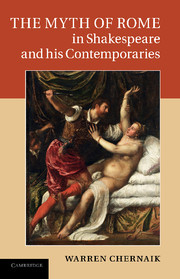Book contents
- Frontmatter
- Contents
- Acknowledgements
- Introduction: a Roman thought
- 1 Roman historians and the myth of Rome
- 2 The wronged Lucretia and the early republic
- 3 Self-inflicted wounds
- 4 ‘Like a Colossus’: Julius Caesar
- 5 Ben Jonson's Rome
- 6 O'erflowing the measure: Antony and Cleopatra
- 7 The city and the battlefield: Coriolanus
- 8 Tyranny and empire
- 9 Ancient Britons and Romans
- Postscript: Shakespeare and the republican tradition
- Notes
- Bibliography
- Index
9 - Ancient Britons and Romans
Published online by Cambridge University Press: 29 March 2011
- Frontmatter
- Contents
- Acknowledgements
- Introduction: a Roman thought
- 1 Roman historians and the myth of Rome
- 2 The wronged Lucretia and the early republic
- 3 Self-inflicted wounds
- 4 ‘Like a Colossus’: Julius Caesar
- 5 Ben Jonson's Rome
- 6 O'erflowing the measure: Antony and Cleopatra
- 7 The city and the battlefield: Coriolanus
- 8 Tyranny and empire
- 9 Ancient Britons and Romans
- Postscript: Shakespeare and the republican tradition
- Notes
- Bibliography
- Index
Summary
BARBARIAN LIBERTY
Cymbeline (1609–10) is one of several plays written early in the reign of James I depicting an encounter between Romans and ancient Britons. Other plays on similar themes include Fletcher's Bonduca (1611), The Valiant Welshman (1615) by R. A. (possibly Robert Armin, Shakespeare's Touchstone), William Rowley's A Shoo-maker a Gentleman (1609), and, several years later, Jasper Fisher's The True Trojans (1625). All these plays are concerned with the growth of the Roman empire and resistance to it, contrasting Romans and barbarians, and all the plays treat Roman values with a degree of scepticism.
There are two traditions in the representation of ancient Britain in Shakespeare's day. One, stemming from Geoffrey of Monmouth's twelfth-century History of the Kings of Britain, is patriotic myth. It gives special prominence to two invented figures: Brutus, who, like Aeneas, fled from burning Troy to establish a new nation, a second Troy, and Arthur, a heroic, doomed king. According to Geoffrey, Julius Caesar, though recognizing that the Britons, like the Romans, were descended from Trojan stock, saw the island as ripe for conquest. Cassivelaunus, King of the Britons, fighting in defence of liberty, to resist ‘perpetual bondage’, led an army which defeated the Romans in two separate battles, causing Caesar to flee to the European mainland.
- Type
- Chapter
- Information
- The Myth of Rome in Shakespeare and his Contemporaries , pp. 219 - 243Publisher: Cambridge University PressPrint publication year: 2011



